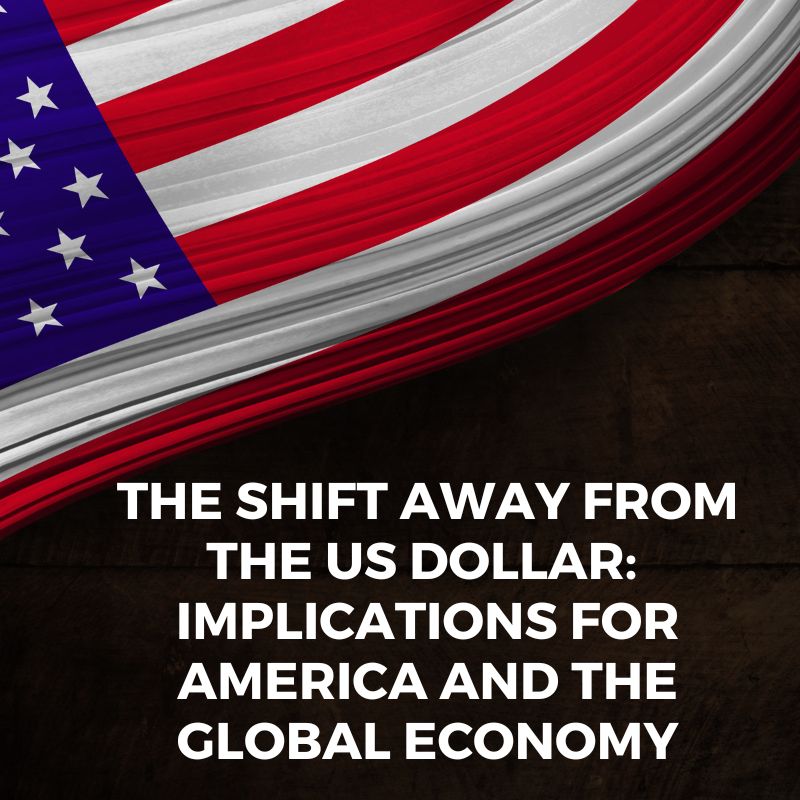The Shift Away from the US Dollar: Implications for America and the Global Economy

The Shift Away from the US Dollar: Implications for America and the Global Economy
A combination of factors drives the rise and fall of empires in a predictable pattern. Some are wealth, power, and the ongoing struggle for dominance.
In his book “Principles for Dealing with the Changing World Order.” Ray Dalio explained the factors contributing to great empires’ growth, prosperity, and eventual decline.
He explained the stages that empires typically go through, from their rise to their inevitable decline. Finally, he explored how understanding these patterns can help us make better decisions in the future.
So let’s dive into his wisdom.
The first stage in the life cycle of an empire is characterized by rapid growth and expansion. Innovation, rivalry, and wealth accumulation are the driving forces behind it.

In this phase, the empire’s education system is critical to nurturing skills and creativity. Moreover, they must foster new ideas, technologies, and industries.
As a result, the empire becomes a center for innovation and a hub for trade, attracting talent from around the world.
This growth also led to the establishment of a strong military. It protected the empire’s interests and ensured its continued expansion.
A well-funded military enables the empire to
- defend its territories,
- maintain internal order, and
- project power abroad.
In this phase, the empire’s currency gains prominence. Often it became the global reserve currency, further solidifying its position as a dominant world power.
As an empire reaches its zenith, it experiences a period of prosperity and stability.

But, this success also increases wealth inequality and a growing divide between the rich and the poor.
As a result, the elite becomes more entrenched in their positions, often at the expense of the less fortunate.
This disparity in wealth distribution breeds resentment and discontent among the lower classes. Further, it leads to internal conflicts and social unrest.
These conflicts can take various forms. For example, they can be peaceful movements that seek to maintain the existing order (the Roosevelt Revolution). However, violent uprisings such as the French, Russian, and Chinese revolutions drastically changed the order.
These internal struggles weaken the empire. Moreover, they make it vulnerable to external rivals who may see an opportunity to challenge its dominance.
During the decline phase, the empire faced increased external challenges from rising rivals who sought to exploit its weaknesses.

The empire must increase military spending when its economy is deteriorating. In addition, it needs to defend itself and its territories.
This financial strain further exacerbated the empire’s decline. In addition, it struggled to balance the need for defense with the challenges posed by internal conflicts.
As the empire weakens, it becomes more susceptible to wars, which are both costly and potentially devastating.
Wars can lead to significant shifts in the global balance of power. For example, losing the power empire resulted in a severe decline in wealth and influence.
Additionally, devaluing an empire’s currency and debt is typically a sign of its demise. This led to massive devaluations and sell-offs. This is obvious in the cases of the Dutch after the Fourth Anglo-Dutch War and the British following World War II.
I am Gordon Grigg, a business coach from Nashville, Tennessee, I studied these trends and want to share my opinion about these principles.
Now see this video, and let’s analyze:
The Shift Away from the US Dollar and its Implications for America and the Global Economy

The US dollar has long been the dominant global reserve currency, playing a central role in international trade and finance.
It served as a benchmark for other currencies and acted as a safe-haven asset during economic uncertainty. The dollar’s status has granted the United States considerable economic and political advantages.
However, recent trends suggest that the dollar’s position may be challenged. As a result, there may be a shift away from its status as the world’s reserve currency.
Understanding the implications of this shift for America and the global economy is crucial to navigating the changing landscape effectively.
A brief overview of the US Dollar’s Role as the World’s reserve currency
Since the Bretton Woods Agreement in 1944, the US dollar has been the primary global reserve currency.
Governments and institutions worldwide hold the dollar in significant quantities as a reserve currency.
They use it to
- ease international transactions,
- manage exchange rate risks, and
- maintain financial stability.
This status has allowed the United States to
- borrow at lower interest rates,
- finance its deficits more easily, and
- exert substantial influence over the global economy.
Recent trends indicating a shift away from the US dollar

The US dollar remains the dominant reserve currency. But several factors suggest a potential shift away from its unparalleled position:
The Emergence of Alternative Reserve Currencies
As the global economy evolves, new players are emerging to challenge the US dollar’s dominance. Two significant contenders are the euro and the Chinese yuan.
1. The Euro:

Since its introduction in 1999, the euro has gained traction as an alternative to the US dollar. It is the official currency of European Union countries. The euro enhances its credibility and appeal as a reserve currency.
While it still lags behind the dollar, the euro has steadily increased its share of global foreign exchange reserves.
2. The Chinese Yuan:

China’s had rapid economic growth and is increasing its global influence. This has positioned the Chinese yuan as another potential challenger to the US dollar.
In 2016, the International Monetary Fund (IMF) included the yuan in its Special Drawing Rights (SDR) basket.
This was a significant milestone in its internationalization. Additionally, China has been promoting the use of the yuan in international trade and investment. All this further erodes the dollar’s dominance.
The Rise of Digital Currencies
Technological advancements have led to the emergence of digital currencies, potentially disrupting the traditional financial system and diminishing the US dollar’s role in global transactions.
- Cryptocurrencies:

Cryptocurrencies like Bitcoin have gained popularity. They became an alternative investment and means of payment. At the same time, they offered decentralization, security, and efficiency.
So cryptocurrencies remain volatile and face regulatory challenges. Moreover, their increasing adoption could impact the demand for traditional reserve currencies. This includes the US dollar, too.
- Central Bank Digital Currencies (CBDCs):

Several central banks worldwide are exploring the development of their digital currencies.
They are driven by the potential benefits of
- lower transaction costs,
- increased financial inclusion, and
- enhanced payment system efficiency.
Implementing CBDCs could provide a more accessible and efficient alternative to the US dollar in cross-border transactions, reducing its dominance.
Geopolitical Tensions

Geopolitical tensions, particularly between the United States and China, have prompted some countries to reevaluate their reliance on the US dollar.
- Economic Rivalry:
As the US and China rivalry intensifies, some nations desire to reduce their dependence on the dollar-dominated financial system. This sentiment could lead to a more diversified global reserve currency landscape, with countries opting for alternative reserve currencies to mitigate potential risks.
- Alternative Payment Systems:
In response to geopolitical tensions, some countries have sought to establish alternative payment systems outside the dollar-based financial system. For example, Russia and China have been developing their payment systems to bypass the US-dominated SWIFT network, which could further weaken the dollar’s grip on global finance.
Fiscal Concerns

The United States’ fiscal situation raises questions about the long-term strength and stability of the US dollar.
- Growing Public Debt:
The US has been grappling with mounting public debt, which could lead to concerns about the sustainability of its fiscal policies. As a result, investors may seek alternative reserve currencies, undermining the dollar’s status as the global safe-haven currency.
- Persistent Trade Deficits:
The US has been running persistent trade deficits, contributing to global imbalances and putting downward pressure on the dollar. If left unaddressed, these deficits could further erode confidence in the US dollar and prompt a shift toward alternative reserve currencies.
Importance of understanding the implications of this shift for America and the global economy

The world is moving toward a more multipolar currency landscape. Therefore, it is vital to understand the potential consequences of the US dollar losing its status as the world’s reserve currency.
The shift could have significant implications for the United States. Some of them are increased borrowing costs, reduced foreign investment, and inflationary pressures.
Changes in the global reserve currency system could lead to
- financial market volatility,
- disruptions to international trade, and
- a shift in the balance of economic power.
Understanding these potential consequences is essential for policymakers and businesses. They must make informed decisions and adapt to the changing global economic landscape.
The United States can work to maintain its economic strength and influence in the world.
The international community must be prepared. It must navigate a changing global currency landscape’s complex economic and geopolitical implications.
Conclusion

The US dollar remains the dominant reserve currency. But there are clear signs that its unparalleled position is being challenged.
The emergence of alternative reserve currencies,
- the rise of digital currencies,
- geopolitical tensions, and
- fiscal concerns
all point to a potential shift away from the dollar as the primary global reserve currency.
Given these trends, policymakers, businesses, and investors must stay informed and adapt to the changing global currency landscape.
Diversifying assets, embracing technological innovations, and fostering international cooperation will be crucial.
Ultimately, the US dollar’s continued dominance as the world’s reserve currency is not guaranteed.
As the global economy undergoes significant transformations, whether the US dollar can maintain its supremacy or if a more diversified reserve currency landscape will emerge remains to be seen.
I am giving you my opinion about this topic. As an entrepreneur and business coach from Nashville, Tennessee, I want to hear your thoughts on it. Leave them in the comments,
Call me to discuss your business. I am here if you need any help. I have the knowledge and expertise to solve all your business problems.
Contact me and watch your business soar!
The Shift Away from the US Dollar: Implications for America and the Global Economy Read More »


































